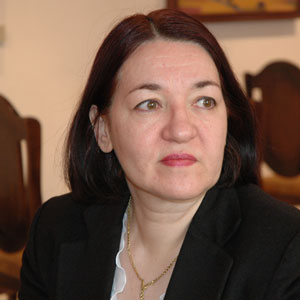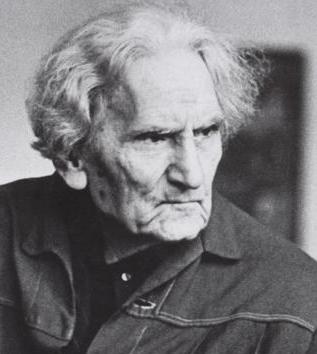
Ruzan Saryan
An interview with renowned artist, Martiros Saryan's granddaughter, Ruzan Saryan, who is also the Saryan house-museum manager.

By Margarita Hovhannisyan
Azad-Hye
What kind of a granddad was the prominent painter?
Besides painting, he also excelled at being a granddad. It's a talent that not everyone has. A lot of parents tell you not to disturb them and to go and play with your own toys. That's wrong and it has bad consequences on the child's psyche. Saryan was the only person of that senior generation, who never said he was busy or that I was disturbing him. He always had time for me. I felt so protected when I was around him. It was such a unique feeling. I remember when grandpa was gone, I used to dream about him the whole time; I used to tell him that people are annoying me and being unfair to me. He used to listen in silence, but never answered. In the mornings, I'd wake up somehow consoled and comforted.
What life lessons would you say you learned from your grandpa?
Whatever he taught us, he did it completely unnoticed. He was so great that it was impossible to be like him even as a person. I believe I learned from him how to have a special attitude towards nature. If I didn't have time to water the flowers for example, I'd feel guilty. I also inherited from him the great feeling of responsibility towards my grandchildren. I have five grandchildren and when I'm around them I always remember my own grandparents.
What were the Saryan family leisure activities?
The other day, people were gathering dried tree branches and leaves and were burning them in our garden. When I smelled the smoke of the fire, I remembered my childhood. The entire family used to go out and tidy the garden together. I loved it when we sat in the garden every evening at the table for tea. My grandmother used to pour tea from the samovar. I was still little, I couldn't really comprehend what the adults were saying, but I could feel the warmth of the atmosphere. Then I remember how we'd go to the forests of Dilijan with my dad, Ghazaros Saryan on the holidays. There, I could feel the harmony of the human and the nature, something that I have never felt anywhere else in my life.
Did Saryan tell you fairy tales?
The fairy tale “expert” was my grandmother. Grandpa did not tell stories, but whenever he was around, everything felt like a fairy tale. With his comments, the nature presented itself differently, the trees, the shrubs, the color of the leaves. For example, when the cherry tree was maturing and some cherries had already become red, Granddad's description was: “These cherries have already met the sun, they blushed because they were embarrassed, as for the others that are still green, well, they haven't met the sun yet”.
Once, we were examining a night butterfly: “Look at the shape of those wings” he said, “The upper part seems to be made of velvet, look at those spots, the harmony of the colors, and the lower part, as if it were made of silk.” Nature would become an unending fairy tale through him.
As for my grandma, well, she opened the world of Aghayan?s and Toumanyan?s stories for me. When I was a school-girl, once she read “Pepo” to us, (you know, he had lived in Tiflis / Tbilisi and he knew the dialect). She read it in such a special way that I have never heard or felt anything like it even in theatres.
As for the one who invented stories, that would be my dad, the renowned composer Ghazaros Saryan. I remember I had the chicken pox and I wasn't feeling well; my father started reading about Carlson. The book was over, but I was still sick in bed, so he kept on reading. Many years later when I started narrating the same story to my own kids, I understood that he had simply made up the rest. Half of the stories were just not there.
Translated by Nanor Mikayelian
Martiros Saryan
TEXT IN ARMENIAN

Պապ լինելու արվեստը
Հարցազրույց աշխարհահռչակ հայ գեղանկարիչ Մարտիրոս Սարյանի թոռնուհու` Ռուզան Սարյանի հետ: Վերջինս մեծ հոր տուն-թանգարանի տնօրենն է նաեւ:
Մարգարիտա Հովհաննիսյան
Ազատ-Հայ
Ինչպիսի՞ մեծ հայր էր հանճարեղ Մարտիրոս Սարյանը:
Նա տիրապետում էր նաև պապ լինելու արվեստին. կրկին տաղանդ, որը ոչ բոլորին է տրված: Շատ ծնողներ կան, որ երեխաներին ասում են` մի? խանգարիր, քո խաղալիքներո?վ գնա զբաղվիր: Դա սխալ է ու վատ հետևանքներ է թողնում փոքրիկների հոգեբանության վրա: Սարյանն իմ ավագ սերնդի ճանաչածս միակ հարազատն էր, ով երբեք չի ասել` զբաղված է կամ իրեն խանգարում եմ: Ինձ համար ժամանակ միշտ գտնում էր: Նրա կողքին ամեն ինչից մի տեսակ պատսպարված էի զգում. առանձնահատուկ զգացում էր: Կարծես արդար էությունն էր նաև հզորացնում իրեն, ու նրա կողքին մարդն իրեն առավել ապահով էր զգում: Հիշում եմ` պապիկը երբ չկար` հաճախ նրան տեսնում էի երազում ու պատմում, որ ինձ նեղացրել են, անարդար են վարվել: Լուռ լսում էր, երբեք չէր պատասխանում, բայց առավոտյան արթնանում էի թեթևացած, սփոփված, մխիթարված:
Սարյանից ի՞նչ առանձնահատուկ դաս վերցրեցիք:
Ասեմ, որ նա բոլորովին աննկատ էր սովորեցնում: Այնպիսի մեծություն էր, որ որպես մարդ էլ անհնար էր նրան նմանվել: Կարծում եմ` նրանից սովորեցի հատուկ վերաբերմունք բնության հանդեպ. եթե չեմ հասցրել օրինակ ծաղիկը ջրել, ինձ մեղավոր եմ զգում: Սարյանից նաև պատասխանատվության մեծ զգացում եմ ժառանգել` ինչպես բնության, այնպես էլ թոռներիս հանդեպ: Հինգ թոռ ունեմ, և նրանց հետ շփվելիս` հիշում եմ պապիկիս և տատիկիս:
Սարյան ընտանիքի համար հաճելի ժամանցը ո՞րն էր:
Վերջերս մեր այգում հավաքել էին չորացած ճյուղերը, տերևները և այրում էին: Խարույկի այդ ծխի հոտը հիշեցրեց մանկությունս, երբ ամբողջ ընտանիքով` մեծից փոքր, այգին կարգի էինք բերում` գարունը պիտի բացվեր, պիտի նորանար մեր այգին: Շատ էի սիրում, երբ երեկոյան նստում էինք թեյի սեղանի շուրջ, տատիկս ինքնաեռով թեյ էր լցնում: Ես դեռ փոքր էի, որ լիովին ընկալեի մեծերի խոսակցությունը, բայց այդ տաքուկ մթնոլորտով թաթախված էի, զգում էի հաճելի մի ջերմություն: Հետո հիշում եմ, թե ինչպես հայրիկիս` Ղազարոս Սարյանի հետ ամեն արձակուրդի կամ ազատ օր գնում էինք Դիլիջանի անտառները: Ինչպես այնտեղ էի զգում մարդ արարածի և բնության ներդաշնակությունը` ոչ մի տեղ չեմ զգացել այլևս?
Սարյանը հեքիաթներ պատմո՞ւմ էր:
Հեքիաթների ?մասնագետը? տատիկն էր: Պապիկը հեքիաթ չէր պատմում, բայց նրա ներկայությունից շրջապատող աշխարհն էիր ընկալում որպես հեքիաթ: Նրա մեկնաբանություններով բնությունն այլ կերպ էր ներկայանում` ծառը, թուփը, տերևի գույնը: Օրինակ` բալենին հասունանում է, ու այն մասը, որը արևկող է, պտուղները կարմրած են, իսկ մյուս մասը` դեռ կանաչ: Պապիկն այսպես էր նկարագրում. ?Բալերն արդեն հանդիպել են արևին, ամոթից շիկնել և կարմրել են, իսկ մյուսները, որ կանաչ են, առայժմ չեն հանդիպել?: Մի անգամ էլ գիշերային թիթեռնիկ էինք ուսումնասիրում. ?Տե?ս, ինչպիսի կտրվածքի են թևիկները. վերևինը կարծես թավշից է, նայիր այս բծերը, գույների համադրությունը, ներքևիններն էլ կարծես մետաքսից լինեն?: Բնությունը նրա միջոցով հեքիաթի էր վերածվում` անվերջանալի հեքիաթի: Տատիկն ինձ համար բացեց Աղայանի, Թումանյանի հեքիաթների աշխարհը: Երբ արդեն դպրոցահասակ էի, մի անգամ ?Պեպո?-ն կարդաց (նա ապրել էր Թիֆլիսում ու գիտեր բարբառը) այնպես, որ ոչ մի թատրոնում այդպես դեռ չեմ զգացել ու ընկալել: Իսկ հեքիաթներ հորինողը հայրս էր` անվանի կոմպոզիտոր Ղազարոս Սարյանը: Հիշում եմ` կարմրուկով էի հիվանդացել` շատ ծանր էի տանում, հայրիկս ընթերցում էր Կառլսոնի մասին: Հետո գիրքը վերջացավ, ես դեռ չէի ապաքինվել, բայց նա շարունակում էր կարդալ: Երբ արդեն իմ երեխաներին էի պատմում այն, հասկացա, որ նա հորինել էր. պատմությունների կեսը չկային պարզապես:
